I should comment, since I have been reading for some time. I enjoy reading your AAR, very good narrative with a lot of mix of characters. The most recent chapter was very good: I enjoyed all the detail of Orthodox Iceland, down to the dioceses: the map was very good. The second part with the sailors was also great: the Aegean reminds me somewhat of the 17th century Caribbean... very interesting.  Keep up the good work!
Keep up the good work!
From Rus to Russia - Russia Megacampaign, pt.2
- Thread starter unmerged(59077)
- Start date
-
We have updated our Community Code of Conduct. Please read through the new rules for the forum that are an integral part of Paradox Interactive’s User Agreement.
You are using an out of date browser. It may not display this or other websites correctly.
You should upgrade or use an alternative browser.
You should upgrade or use an alternative browser.
The Byzantines must not fear the Turk! The blessed Theotokos will guide them through their hardship! Perhaps the Rus should help them see this, maybe lead by example?
Have I been updating too fast? I may slow down a bit eventually.
No, don't mind me, your pace is perfectly fine. I've just been out of the forum for a month
Well done, Spain, and now I shall watch the final without really rooting for anyone. Either way, it will be a historic first.
I'm still celebrating
Could you show map of how it looks? cause i have not enough time to read it all  ... or maybe i have but i am to lazy
... or maybe i have but i am to lazy  .
.
I love it ! the chanting honestly was my favourite part and one of your most clever masterstrokes . I love the alternateness of your world since you flesh it out so well and give us glimpses into these differed lives !
Replies:
Iwanow: I hope this map (which traces the movement of the main characters through the world as well as principal cities mentioned in the story) can explain what happened:
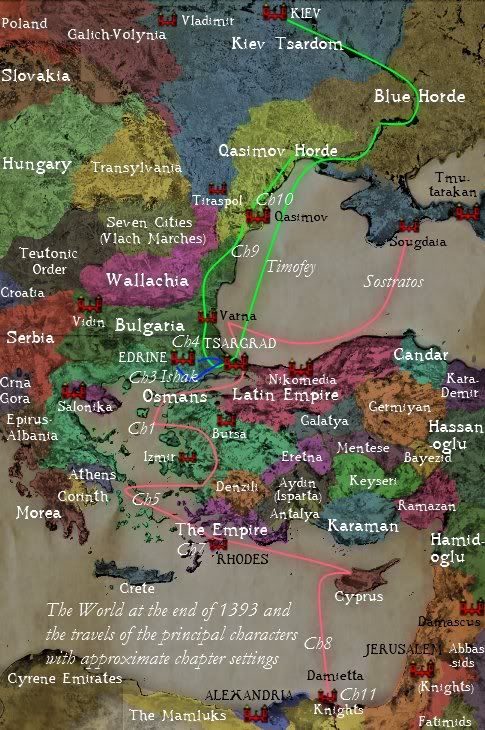
In game terms (and yes, there is a game behind this; I can probably provide screenshots if people want but it's a fair amount of work, plus the screens will look nothing like what any released mod will look like (it was for MMP 1393 for In Nomine).
What happened, in plain terms:
I built two more galleys from my starting navy, allied with Bulgaria; immediately, Osmans and Latin Polish Empire declared war on Bulgaria.
Bulgaria, Kiev and Croatia vs. Serbia, Latin Empire and Osmans and their vassals resulted in my navy being sunk and a few victories and losses, no provinces exchanging hands. Bulgaria as leader accepted peace by cancelling treaties with the Byzantine Empire and giving up the core on Edirne.
I walked my expeditionary force from Bulgaria to Kiev overland, asking for passage rights from the Kasimov Horde, then ran into some trouble. You will learn about that in the later chapters.
During the war my Tsar (Vsevolod IV Zveni-Bulat) died and his son and heir Keistut the Young (both CK characters) took over. I entered a royal marriage with Lithuania. I also hired a general (Timofey Rukavitsyn, F0/S3/M2/Sg0)
Osman vassals include Serbia, Venice, Corinth, Crete and most of the Anatolian Beyliks. Byzantine vassals include Dalmatia, Morea. Bulgaria is the overlord of Wallachia (but not allied at the start of the game).
Vesimir: thank you for the vote and thank you for the map praise. I hope you like the one above as well.
Drake Rlugia: the Aegean is a lot of fun; you can see there's many, many independent statelets in the beginning of the game, and most will probably welcome privateer activity.
Serek000: Well, some in Rhodes are certainly of the same opinion as you are; but war with the Osmans is always risky.
aldriq: Well, the next couple of updates do deal with Timofey, so you may well be right.
As for Spain winning - I do acknowledge they are the best team in the world right now, but they really really desperately need another healthy striker to make their games less stifling. Possession play alone does not an entertaining game make, no matter how clever, and I do remember Spain being breathtaking on occasion - just not last month.
canonized: thank you very much and I'm really glad people did like the chant; and yes, I do spend a lot of effort on the world-building, so it is always a pleasure when people comment on that.
Also, I found this little thing: http://iwl.me/ - a site where you can post a sample of your writing and see what writer's style you match. I ran it chapter by chapter since the beginning of the narrative, and got some surprising results:
Ch1 - Sostratos - Lev Tolstoy
Ch2 - Andrey - Lev Tolstoy
Ch3 - Ishak - Chuck Palahniuk
Ch4 - Timofey - H.P.Lovecraft
Ch5 - Sostratos - Daniel Defoe
Ch6 - Konrad - Robert Louis Stevenson (I can buy that one)
Ch7 - Sostratos - Daniel Defoe again (is it because ships are involved?)
The Pleading of Poor Daniel: James Joyce - which is kind of interesting because the "Pleading" is really a very loose translation of a 13th c. Russian original.
Iwanow: I hope this map (which traces the movement of the main characters through the world as well as principal cities mentioned in the story) can explain what happened:

In game terms (and yes, there is a game behind this; I can probably provide screenshots if people want but it's a fair amount of work, plus the screens will look nothing like what any released mod will look like (it was for MMP 1393 for In Nomine).
What happened, in plain terms:
I built two more galleys from my starting navy, allied with Bulgaria; immediately, Osmans and Latin Polish Empire declared war on Bulgaria.
Bulgaria, Kiev and Croatia vs. Serbia, Latin Empire and Osmans and their vassals resulted in my navy being sunk and a few victories and losses, no provinces exchanging hands. Bulgaria as leader accepted peace by cancelling treaties with the Byzantine Empire and giving up the core on Edirne.
I walked my expeditionary force from Bulgaria to Kiev overland, asking for passage rights from the Kasimov Horde, then ran into some trouble. You will learn about that in the later chapters.
During the war my Tsar (Vsevolod IV Zveni-Bulat) died and his son and heir Keistut the Young (both CK characters) took over. I entered a royal marriage with Lithuania. I also hired a general (Timofey Rukavitsyn, F0/S3/M2/Sg0)
Osman vassals include Serbia, Venice, Corinth, Crete and most of the Anatolian Beyliks. Byzantine vassals include Dalmatia, Morea. Bulgaria is the overlord of Wallachia (but not allied at the start of the game).
-----
Vesimir: thank you for the vote and thank you for the map praise. I hope you like the one above as well.
Drake Rlugia: the Aegean is a lot of fun; you can see there's many, many independent statelets in the beginning of the game, and most will probably welcome privateer activity.
Serek000: Well, some in Rhodes are certainly of the same opinion as you are; but war with the Osmans is always risky.
aldriq: Well, the next couple of updates do deal with Timofey, so you may well be right.
As for Spain winning - I do acknowledge they are the best team in the world right now, but they really really desperately need another healthy striker to make their games less stifling. Possession play alone does not an entertaining game make, no matter how clever, and I do remember Spain being breathtaking on occasion - just not last month.
canonized: thank you very much and I'm really glad people did like the chant; and yes, I do spend a lot of effort on the world-building, so it is always a pleasure when people comment on that.
-----
Also, I found this little thing: http://iwl.me/ - a site where you can post a sample of your writing and see what writer's style you match. I ran it chapter by chapter since the beginning of the narrative, and got some surprising results:
Ch1 - Sostratos - Lev Tolstoy
Ch2 - Andrey - Lev Tolstoy
Ch3 - Ishak - Chuck Palahniuk
Ch4 - Timofey - H.P.Lovecraft
Ch5 - Sostratos - Daniel Defoe
Ch6 - Konrad - Robert Louis Stevenson (I can buy that one)
Ch7 - Sostratos - Daniel Defoe again (is it because ships are involved?)
The Pleading of Poor Daniel: James Joyce - which is kind of interesting because the "Pleading" is really a very loose translation of a 13th c. Russian original.
Last edited:
RGB, this is brilliant! I'm a big fan of Edward Rutherford's books, especially Russka. Your calibre of writing is just as engaging. Having just browsed through the first part, one of these nights, I'm going to catch up to this.
Mhm..
The map is hard to read for me. Lots of colours, no country borders, untidy. And red castles never look good on green background. But that's just me. I like my maps clear and easy to read. Bases like the one you have here, ones that have RL mountains and such aren't good for that. Do mind that this is constructive criticism.
But that's just me. I like my maps clear and easy to read. Bases like the one you have here, ones that have RL mountains and such aren't good for that. Do mind that this is constructive criticism.  And it's not a big deal, just me. Though if you would stay to one type of colours, I'm sure it wouldn't hurt. Cold or warm ones.
And it's not a big deal, just me. Though if you would stay to one type of colours, I'm sure it wouldn't hurt. Cold or warm ones.
Well, there's my opinion on the map. As for the I Write Like website, I'm not too happy. My style is Dan Brownish. :/ Though I score major cause my narrative (At least the one that's at the start of the Agincourt update.) can be compared to Ian Flemmings work.
The map is hard to read for me. Lots of colours, no country borders, untidy. And red castles never look good on green background.
Well, there's my opinion on the map. As for the I Write Like website, I'm not too happy. My style is Dan Brownish. :/ Though I score major cause my narrative (At least the one that's at the start of the Agincourt update.) can be compared to Ian Flemmings work.
It said my writing was all over the board as well. Made me giggle. :rofl:
Personally I think the map is gorgeous, even if as Vesimir points out, there are points where its a little unclear. Here's an idea--if you're using layers for each country, you can make a boundary around each layer then compress them down. That'd allow you to keep the topography while adding clearer borders. Play around a bit, you'll find your map style!
Personally I think the map is gorgeous, even if as Vesimir points out, there are points where its a little unclear. Here's an idea--if you're using layers for each country, you can make a boundary around each layer then compress them down. That'd allow you to keep the topography while adding clearer borders. Play around a bit, you'll find your map style!
axzhang: that's quite the comparison! I must confess I've never read that one, but it sounds really interesting and perhaps more suited to what I'm doing than my own basic inspiration (Valentin Ivanov, more or less).
I hope this does interest you enough to catch up. Meanwhile, your own AARland contribution is very strong and characterful, so I will probably hang out on your thread a little as well.
dinofs: thanks. I am unhappy with some parts of it, but I do find this a useful concept, actually. What does everyone think about me tracking my characters on maps like that one and having a once-in-a-while gameplay report?
Vesimir: that website is silly, I think. But entertaining, at least the first time round.
Re: constructive criticism - I do appreciate it, fear not, and I do agree with most of it. However, I also do like having real rivers and mountains on the map; it really helps with city and border accuracy.
General_BT: aha! Perhaps a solution to avoid making the map look like HoI3.
Thanks everyone!
And now - new update. As promised, on a Sunday. I didn't say which week, did I ?
?
I hope this does interest you enough to catch up. Meanwhile, your own AARland contribution is very strong and characterful, so I will probably hang out on your thread a little as well.
dinofs: thanks. I am unhappy with some parts of it, but I do find this a useful concept, actually. What does everyone think about me tracking my characters on maps like that one and having a once-in-a-while gameplay report?
Vesimir: that website is silly, I think. But entertaining, at least the first time round.
Re: constructive criticism - I do appreciate it, fear not, and I do agree with most of it. However, I also do like having real rivers and mountains on the map; it really helps with city and border accuracy.
General_BT: aha! Perhaps a solution to avoid making the map look like HoI3.
Thanks everyone!
And now - new update. As promised, on a Sunday. I didn't say which week, did I
From Rus to Russia
Waves of Blood and Grass
VIII
Sostratos
Waves of Blood and Grass
VIII
Sostratos
After a week and a half of almost continuous sailing, only interrupted by a brief stop in Cyprus to resupply, Sostratos was anticipating the end of the voyage. The crew of the Lebedos had an easy voyage; supplemented by Rhodian sailors, they were now only slightly short on hands, and there were no exertions to speed, since the great galley wasn’t allowed to outpace the slower Prinkeps Ioannis that escorted her. Nor was there much danger; the weather was good, the sea dependable, and the only time suspicious boats approached aggressively ended peacefully, as the local pirates realized they were facing forces greater than their own. The uneventful nature of the voyage allowed the crews to mingle a little; Sostratos participated togetether with the rest, but remained mindful of the impending end to this partnership.
Ahead lay Egypt, the fabled Delta of the mighty Nile, where Christian cities of the coast traded and warred intermittently with the Muslim-ruled interior, home of the Mamluk Sultans. The Knights of St.John, the foremost of the Hospitalier orders that aided the Latin pilgrims in the lands of the Kaisars of Jerusalem, made their home in Damietta, the second most important port after Alexandria itself. Having entrenched themselves in the land and in the good graces of the Greek lords of the Holy Land over the last century and a half, they spent lavishly to fortify and protect their coastal holdings, with effort far in excess of that they gave the inland castles across the Jordan, which they also operated. The Knights and their navy was why lord Laskaris sent the Crimean sailors south. Once in their lands, Sostratos' men were free to do as they pleased, and in return the Rhodian expedition owed them no further help.
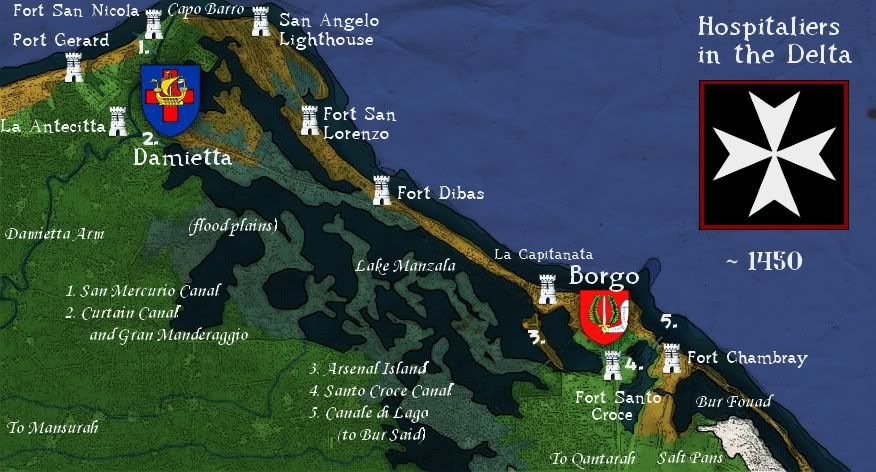
Nonetheless, during their time together, the young kephalos had learned a fair bit, and so had the other officers; as Egypt grew closer, he decided it was time to pick their brains about the voyage so far. As usual, he went to the papas first, having shared with the secretary a friendship of many years.
“What do you think of this whole adventure?”
Gennadios smiled.
“It wasn’t all that bad once we got out of Rhodes, though Rhodes may have been nice if Laskaris let us see it. The weather and the slack pace almost makes one forget our true situation; moneyless, purposeless, thousands of miles from a home, blocked from returning by some evil bastards. Today, however, life is good.”
“What of the Rhodians?” Sostratos asked.
“Well, this lot means no harm, though they may cause some yet. Pytho spends a lot of time talking to them, learning how to command a ship; I think the nasty man wants to have his own korabos to command eventually, kephalos”
“Good luck to him,” Sostratos brushed it aside. “Pytho we can manage, what of the Rhodians?”
“Well, you’ve talked to them, I’ve talked to them, every one of our people talked to them. They’re not overly cautious with what they say, either.”
This was true, and ran from the lowly crew all the way to the Rhodian captain, Manuel Tsouras, the very same that first intercepted the Lebedos that night in Rhodes. He was as opinionated as any of his men, and not afraid to share.
“The navy is the only thing keeping the Empire afloat, see,” Tsouras said, with a self-congratulatory smirk, as one of the conversations between him and Sostratos turned to the unusual handling of their arrival.
“The army, well, what kind of army can we have when the Roman Emperor holds no stronghold further than a stone’s throw from the water? Sure, there’s people in Rhodes and people in Thessaloniki, but we need more ships before we need more garrisons. Still, the Emperor’s court rewards the soldiers before us poor sailors; and that’s not a surprise; hardly a man on any of the ships had been born in a palace. No horsemen here!
Lord Laskaris, however, he is different, even if he is as palace-born as the rest of them; they weren’t always, you know, the Laskarids. Peasants, at first. Won it all by merit. He cares about his people, and by his people I mean the navy; we keep the rest of the Empire safe. If he puts in more effort into resolving these things, than the court diplomats, I don’t blame you. If he asked the Emperor’s opinion, nothing would ever get done, because the protocol masters would bury the matter. I’d rather be Laskaris’ man, thank you very much.”
Sostratos professed agreement, of course, but a doubt about the inevitability of their current situation crept in after this exchange; perhaps Laskaris had deeper plans of his own, and Sostratos’ men were not as fortunate to deal with him first as opposed to the court as the captain asserted. Fortune’s wheel spun bewildering threads, and Sostratos wasn’t sure he was following the right one. Perhaps he could find it if he got some more answers.
“I must say though,” Gennadios continued, shaking the kephalos out of his thoughts, “they certainly showed me a thing or two about naval organization.”
“They did? What do they do that you find useful?”
Gennadios frowned.
“It’s not what they do that I learned was useful, it was what I learned about what we do. We run our ships like a business…like privateers, or maybe venture merchants. The Tsar wanted a navy, so Old Fishface and I bought Philomena, and then we got you and Markos to join us. So we’re the komiteia, the committee, and we run the ship. This makes every one of us a komes, yes, and it sounds grand and may be a good enough way to run a ship, but is a rotten way to run a navy. What holds it together is a bunch of unenforceable contracts. Even Pytho is a private operator and all his lads mercenary scum.
How can you run it as a fighting force if everything is private? Take procurements. I did them all myself, and a pretty grivnya it cost me too. I did it anyhow, because they promised to pay us all in the end for the trouble. The obvious downfall of that is that the navy bursar is also a privateer of sorts, who got his job by promising the Tsar a good sum for a good job. So his interest is naturally in negotiating as little reimbursement to us as possible. Well, I thought we’d make money anyway, from looting the coast, which we did well enough, no doubt causing our names to be cursed for generations, but then we hit another snag. Or two.
That ugly goat Pytho, because his lads did almost all of the pillaging, didn’t want to share and kept most of the proceeds; but the bursar of course had already estimated our probable take from raiding and subtracted it from the payout we were supposed to have received at the end of it all, and of course we were paid not a penny in the end because we never made it back home.
The Emperor’s crew worries about no such thing; their sea ministry provides them with everything they need to run their tasks, so they don’t have to burrow money, haggle, engage in piracy or vainly attempt to circumvent unscrupulous tax farmers and hired thugs calling themselves ministers. On one hand, that is why those cheap Rhodians had no silver for us, on the other hand their fleet won’t mutiny and turn pirate. But the way the Tsar runs his navy, pirates is all we’ll be producing for a good long while.”
The left Sostratos thinking about just what they were good at; not finding a good answer, he went to talk to Markos.
“So, you’ve seen the ship they will give us after this is over. Would it be any good in a navy?”
“Navy? Why, we’re going to drag it on our backs across the Balkans? We’re not sailing there any time soon; but yes, I did have time to think on what I would want of it in my fleet.”
“And what would that be?”
“Well, depending on how many men and how much gold I would have. Everyone I have seen has galleys for fighting, but galleys need a lot of men; we set off with half our navy being koraboi, because that’s what we use at home, but we weren’t really prepared, I think. Take the galleys; rowers, sailors, and marines. Galleys attack with the prow, so they need marines for boarding. We have ballisteia on them, but they’re strictly weapons used against people. The koraboi, too, are only good with crossbowmen, and our square sails mean we turn slowly in battle, and have to get the oars out to maenouvre quickly…but then we lose linear speed and can be caught by galleys, so they’re not very good warships. Now this Prinkeps they gave us, it’s on old tub compared to Philomena, but I see how the lateen sails they use are good on an all-sail warship. Or a privateer. Or a courier. You saw how quickly that Ragusan turned and hid from Lebedos when he needed to. If it wasn’t such a tub maybe he’d have gotten away altogether.
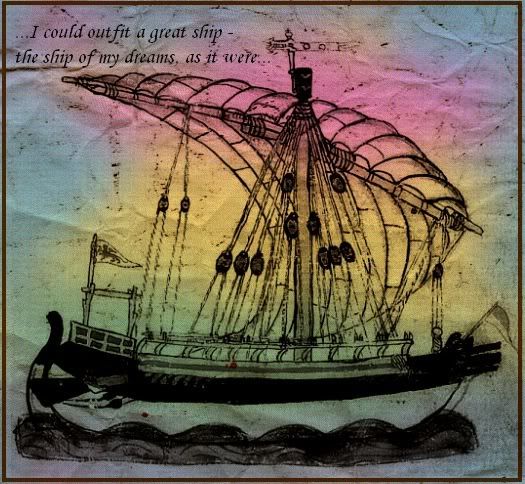
I don’t know...if I had the right hull, though it would need to be longer, I could outfit a great ship. The ship of my dreams, as it were. That’s why I’m watching these Rhodians, see if they know a lot that I don’t. Maybe I could build a ship that can outrun those galleys they call dromons and attack the kommisoi. Merchant crews won’t stand up to marines, I think, no matter how you arm them. We shouldn’t be pressing merchants into the navy. And we shouldn’t be fighting sea battles like land battles! We need something to attack ships rather than crews, if we’re sailing a korabos. We can rarely beat a galley hand to hand, we’d lose too many men. The Tsar has some of the finest guns in the world, and we sell a good few through Crimea, but not a one sailed with us, not even on the flagship. So they explode sometimes, so they take a long time to fire; but you can send anything with that shot. You can shoot at sails, you can set the ship on fire. You can do anything with practice; and they take less space than throwing arms, so you can have more of them. If the opponent learns of these armaments, he may even stand down lesser ships with no fight. I wonder if they already do against the ships in these parts.
…and think of what one can do with one of the big xelandia! Sure it’s long, and sure it’s unwieldy, but our Theodosia fought well, and that was only with boarding. It’s about as sea-worthy as you’d expect, what with a detachable keel, but if you line up cannon on the raised decks? You couldn’t even approach that thing for boarding! Still, I can never afford a flagship, so no point talking about it. As for me personally, I’d really want to have a ship that could be good for trading, and good in a fight…I don’t want to say it, but the privateer has more options. At home, or even here.”
Sostratos looked at the sailing master briefly, wondering.
“You and the papas are rather scarier a pair characters than I supposed,” he said.
Markos shrugged.

Eventually, the two ships saw the long, low sand flats of Egypt’s Nile delta frame the slow warm surf. A small, nimble Italianate galley that Sostratos would later learned was called a fusta pounced on them out of the mouth of the river. This kind of visit was probably more common than most suspected, however, for it then changed its approach to a friendly one as Tsouras sent flag signals to the captain of the Knights.
The fusta sent a boat with a pilot and one more man; the pilot would be necessary to guide the larger galley through the river until Damietta. The other man was an actual Knight, a young-looking Lombard in a red surcoat with a white cross. The ships crawled at a snail’s pace, so Sostratos found the time to engage the man in conversation.
Though the Italian’s Greek was at times difficult to understand, Sostratos learned useful things. The knight’s name was Vincenzo Semifonti, he was a baron’s second son, and he had left his native Tuscany for Egypt several years ago. Having mostly served the langue of Lombardy’s hospital, he was now eager to get transferred to the Borgo, a stronghold and a military port east of Damietta, sitting astride a large sandy bank separating the sea from the locked lagoons of Manzala and Saidiya. The Borgo was where larger galleys like Lebedos were normally stationed. Vincenzo loved talking about ships, and Sostratos soon found out why.
“We knights go on corso; it is part of our duties, authorized by the Grandmaster, the Holy Father, and the Lord of Jerusalem,” the young knight explained. “Some do it on land, defending Christian traders and pilgrims, some do it on the sea. The sea is very dangerous. There’s pirates in Denia, pirates in Tripoli, pirates in Alexandretta. There’s even pirates that sail from the Nile into the Delta and hunt there.
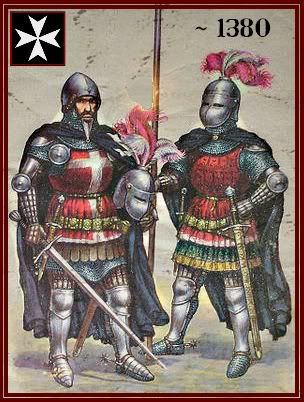
“This allows us to spend on charitable projects of our choice, or create comfort for our spiritual dependents; as you know, we have sworn a vow of poverty. The rewards will not line our own pockets, but make no mistake, if a private captain would be helping a Brother Captain in this endeavor, then half goes to the Grandmaster, and then the remainder gets split between the ships that participated. It’s not bad, for serving the defense of Christendom in the land of its cradle. And on some years, we need all the help we can get.”
The date palms lining both sides of the river channel leading to Damietta’s military manderaggio cast shade on the still water under the hot Egyptian sun and the oars rising and falling gently lulled Sostratos’ protesting conscience and reluctance to sleep. If everyone said the same thing, why should he object? Perhaps, perhaps – there was a way to profit from this challenge Fortune set him.
-----------
IX
Timofey
IX
Timofey
“You’re not making any sense, man,” Timofey growled at the skomorokh, prancing and writhing in front of his drumming and piping companions on the main square of a disappointingly small and shabby Belgorod on the Dniester. Behind the performer and his musician friends, a tame bear sat despondently, matching the general feel of the place.
The town was a confluence of the interests of Kiev’s vassals, the boyars of Bessarabia, the Qasimov Horde, and the distant Bulgarians and Wallachians. It was also supposedly a key strategic point, with a castle built by the Venetians in centuries past making it attractive to anyone seeking firmer control of the territory. On the day that Timofey’s battered army finally reached it, it looked like all that talk was a myth and no more; the city looked sleepy, the castle run-down and empty. More importantly, no armed men came to greet or intercept them, though Timofey and his fellow commanders were told to expect Qasimov Tatars, with whom the Tsar had an agreement to peaceful passage. Most importantly, there were not enough boats to allow comfortable crossing of the daunting Dniestr liman, the river lagoon rivaling many renowned lakes in size.
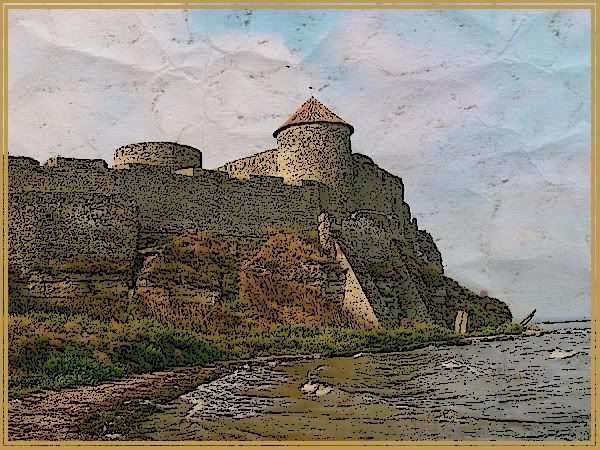
Timofey’s search for answers only led him to annoying travelling fools, who now insisted on sapping his patience. They were a large band, probably armed. This let them travel safely, and even rob other travelers sometimes. The common people loved them, but even to indulgent Timofey the performers were a nuisance and a menace. They mocked the nobility, they blasphemed against God; they spoke in an incomprehensible criminal argot between themselves, and in dense riddles in they chose to speak a plain language. They also reputedly stole children to replenish their ranks. But they often had information, and information was what Timofey wanted. So far, the attempts were unsuccessful.
“If I don’t get one of you to speak some sense you will pay!”
They ignored him, while Belgorod’s people – not the most knowledgeable either – looked on with unfriendly faces. Timofey wished he brought a bigger guard with him. He decided to change approach.
“If I don’t understand the singing, I won’t pay for the dancing!” he announced, and shook the money bag.
One of the musicians suddenly said something sharp, and the band split up to produce another entertainer, who addressed Timofey directly, in Russian, shaking a tambourine as he spoke.
“One had three brothers, and they three brothers each; and so they spoke with a human tongue. But birds flew in from the east, and their talons were sharp, and so all the brothers had their tongues torn out, except one, because he was giving comfort the priest’s wife with it. But when he saw it, he cried, and the good wife, oh so pious, she interceded, she prayed, oh the tears she shed. And god sent the angels, but the road is long, and they stopped in a tavern in Tiraspol, and got drunk, the mead is bad and the wine is heady in Moldavia, the boyars drink all the good stuff. So the angels lost the bag with the tongues they carried, and had to get new ones to give the mutilated mute; so some got tongue of goat, some got donkey; some a serpent, some a Greek, can’t tell them apart; some a gypsy, some a Vlach, and some got even more useless. So the last brother is still the only with human speech, but it does him no good.”
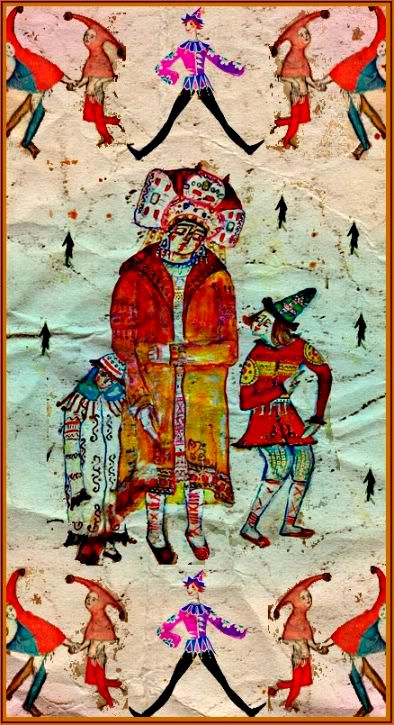
Timofey groaned. Of course they were a ragtag bunch. In the heyday of the old Empire, polyglot bands wandered slowly from Novgorod to Salonika; but those days were long gone in Rus, though perhaps not in the steppes of Bessarabia.
“Why is the city empty? Where are the boats? Where are the Tatars?”
The skomorokh grinned, then launched into spinning quick circles around Timofey’s horse, shouting.
“To teach the learned is to waste the learning, they know everything, a fool cannot teach them. There was a market, but nobody had gold, so nobody came, and the locusts ate it all, and the poor little women cried and some pipers comforted them, so you know. Kindness begets kindness!”
“I will pay you, but if you keep on being useless, I will eagerly break your kneecaps,” Timofey replied, “since now I know you’ll understand why. Why are the Khan’s men not here?”
“Oh there was a house on a hill and what a nice house it was, the shutters were painted bright and the doorsteps made from oakwood! But believe it or don’t believe it, it split in two, and grew legs, and some ran west and some skipped east and some went south and some hopped north, and none came to the marketplace, because the bears ate all the apples. God’s honest truth!” the skomorokh announced, imitating the running, hopping, walking and skipping.
“Boats,” Timofey managed finally. It was a little clearer, but of course, they could have been lying. Fools were fools for a reason.
“The birds eat tongues, the birds eat fish, fish fly away, birds swim away, I do not know. I am like a flower in the field, soaking up the sun, growing fat on horse droppings.”
Timofey felt blood rush to his face in anger. Before he did anything he would have to repent in church for, he threw the small bag with money straight at the skomorokh, who fell down theatrically and screamed pitifully even as he pocketed it.
“Ai, ai, the Lord smote me down with a comet for my evil ways! Surely there will be unrest in the land! Misha my love, come rescue me!”
The bear was released by the handler and ambled over to the stricken jester, nuzzling him. He jumped up and started dancing with it; the spectators, clearly relieved to see the armed Russians gone, started hooting in appreciation. The skomorokhs started up a jaunty Romanian tune to the approval of the locals.
You're the girl with no soul, with no soul,
Come on outside girl, so all the fools can see you,
Come on, God, what do you have against her
She doesn't know what's wrong with her
Oi oi oi, she doesn’t even know!
You're the girl, the good girl, who doesn't play with me,
Oi oi oi, girl, and you don’t even know!
Maybe witches or maybe gypsies,
Oi oi oi but you don’t even know!
Come on outside girl, so all the fools can see you,
Come on, God, what do you have against her
She doesn't know what's wrong with her
Oi oi oi, she doesn’t even know!
You're the girl, the good girl, who doesn't play with me,
Oi oi oi, girl, and you don’t even know!
Maybe witches or maybe gypsies,
Oi oi oi but you don’t even know!
The sounds of the skomorokhs fading behind him, Timofey rode back to the army camp, armed with the knowledge that something was wrong in the Qasimov horde, wrong enough that it made the Tatars leave Belgorod undefended. The Dniestr khans were rarely hostile towards Kiev, but the situation demanded caution.
The march to the edge of the Bulgar Tsardom went as smoothly as he could have hoped for; the Bulgarian fleet shadowed their coastal route for a while, before half of the Rus turned inwards to Silistra; but the supplies were always available even then if not very ample. The two columns reunited at the town of Braila, and crossed the Bulgar border. From there, the next supply point was Qasimov itself. The sustained but unhurried pace didn’t strain the soldiers, although he did hold true to his word and had some captains of tens stripped of ranks and whipped when he discovered they were letting their men swap gear with others in other units, and with the locals, which left some of the less skilful traders without necessities. A very few others were caught stealing supplies from the road camps. Timofey demanded of the assembled forces whether their rations were sufficient; the men reluctantly agreed. Having concluded that since rations were sufficient, stealing supplies was a crime against fellow soldiers, he had the perpetrators executed as an example. The sailors, also, had to be inspected often for health and equipment, having noticeably less discipline than even the infantry. Other than these minor incidents, it went smoothly – until now.
His orders were to march swift; he could delay to resolve what happened diplomatically, but it was a big risk. Still, without knowledge, walking ahead was risky. He sent a few scouts across the liman, and at the end of the third day none returned. There was no more time to waste. He had to make decisions.
The Bessarabian horse were leaving for their homes upstream along the Dniestr; he did not think he would need their fighting ability, but they would slow down the crossing. Along with them he sent a capable second in command, to lead the mounted infantry of the Vladimir contingent home along a different route. The day after, the mercenary infantry were detached to make their way around the liman; this was the long way around the obstacle, perhaps three or four days long marching fast. The okhotnichye lyudi returned only two days later, insisting that they saw a large force of riders blocking their way. To their credit, they brought more food with them than they left with; in a situation like this, Timofey didn’t want to ask how they came by it.
Although he immediately regretted letting the Bessarabians and the Vladmir men go, it was already done. There was no other choice except to attempt the crossing. The non-soldiers were set to work. Trees were felled and floated across the liman with the help of the few boats Belgorod still had, to assemble an impromptu fort on the other side. Timofey hoped this would be enough to allow slow crossing of the troops, regiment by regiment. Large rafts constructed concurrently and crewed by the sailors would proceed in relative safety if the landing point was defended. Despite the urgency of the work and his large force, this took several days. If the hostile men on the opposite shore had spies, they had time to prepare, but there was little to be done about that, other than surrounding the city with pickets.
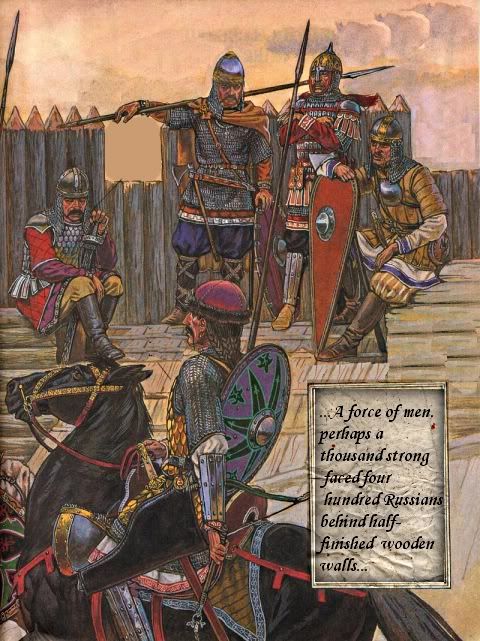
In the end, the pre-prepared fort walls doubled as rafts to the first batch of soldiers, who assembled it with haste once landing was made. More arrived later, making three crossings before a pillar of dust on the horizon signaled the operation was found out. A force of mounted men, perhaps a thousand strong, perhaps a little less, faced four hundred Russians behind half-finished wooden walls; but the Tatars were cautious as well, and instead of attacking at once, they sent messengers.
“What are you doing here, Rus?” one demanded of Timofey, who came out to meet him.
“Your Khan promised us safe passage, baatyr. We received no welcome, no food in Belgorod. We didn’t even have enough boats.”
“Turn around, go through Podolia; your people are waiting for you there.”
“You don’t tell me what to do! It will take too long. We had an agreement, baatyr. I represent the Tsar of Kiev! We need passage!”
“If all you need is passage, why did you build walls? Take the walls down, we will share a drink of friendship.”
“We will take them down if you let us pass to Qasimov in peace.”
“If you come in a little time, baatur, just a few days, the Khan will greet you himself. Would you not wish for a proper welcome?” the messenger stalled for time, “Choban-khan would not wish to welcome you to an unready city.”
“Choban-khan is a considerate man; but what of Iskender-khan, his father?”
“Iskender-khan is well, and sends his greetings, but he isn’t in the city” the messenger replied.
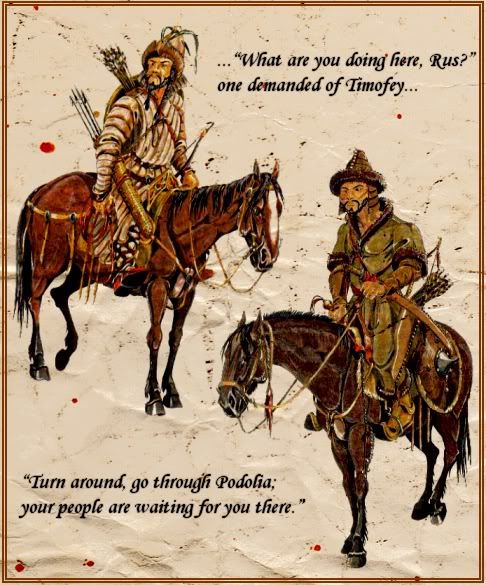
“We need to stop in Qasimov before we go home, tell Iskender-khan that.”
“The Khan will return soon, baatur; we will bring food and supplies, you just wait,” the messenger offered, clearly seeing he wasn’t influencing Timofey.
“We will wait, but do not take too long! Otherwise, word of Iskander-khan’s lack of hospitality may reach far and wide!”
“Not long!” – and the Tatar was gone in a cloud of dust.
Timofey spat into the dirt, and walked back into the walls, bumping into Kirill.
“How long do you intend to wait, strategos?” the minster asked, worried. He wasn’t a warrior, after all.
“How long? Long enough to get all our men across, and no longer. They won’t be bringing food, they will be bringing more men to starve us out. I don’t know what happened there, but they don’t want us reaching the city, that much is plain.”
“What do you intend to do when we leave the fort and they reach us, then?”
“In the long term, I don’t know. In the short term - we show them why you don’t mess with the Tsar of Rus.”
------
A special thank-you to Gogol Bordello for inspiring a good chunk of this update and providing me with the Skomorokh Song!
In the next installment of Rus to Russia: A ship is named and a storm is weathered. See you all next weekend!
Last edited:
excellent pictures in this update ! and rather excellent way of cuing us in on analysis in the form of the conversational style . well done !
1) I definitely approve of the new graphics. They are gorgeous and the quotes in them lend the update an episodic air. Well done! 
2) Ah, so the Knights do what they did best in history--naval warfare. Looks like some ideas are bouncing around for carracks to replace the galleys? Naval warfare before cannon, height is an amazing advantage...
3) I loved the jester scenes! I feel Timofey's frustration, but hey, look who he was talking to!
4) I think the Khan is about to find out that toying with the Tsar's people is a very very bad idea. Especially when he has an army, ragtag as it might be, in the Khan's lands.
Excellent work, this just keeps getting better and better!
2) Ah, so the Knights do what they did best in history--naval warfare. Looks like some ideas are bouncing around for carracks to replace the galleys? Naval warfare before cannon, height is an amazing advantage...
3) I loved the jester scenes! I feel Timofey's frustration, but hey, look who he was talking to!
4) I think the Khan is about to find out that toying with the Tsar's people is a very very bad idea. Especially when he has an army, ragtag as it might be, in the Khan's lands.
Excellent work, this just keeps getting better and better!
Pirates, pirates everywhere.
Eastern Mediterranean has the highest density of pirates on earth?
More than in Bengal, Malacca and China?
Eastern Mediterranean has the highest density of pirates on earth?
More than in Bengal, Malacca and China?
Finally caught up, including the pleading of Daniel... all great chapters. As usual so far Sostratos gets the most dramatic moments - is this chance or design? Great to get the character route map, by the way, without it the naval routes are easy enough to figure out, but the land ones are trickier.
As for Spain, I fear they will only go downhill from here, as it is the fate of most things when they reach the top. But I agree with you, I only watched the English and Spanish matches and both teams offered plenty of boring/frustrating football given their 'alleged' level.
As for Spain, I fear they will only go downhill from here, as it is the fate of most things when they reach the top. But I agree with you, I only watched the English and Spanish matches and both teams offered plenty of boring/frustrating football given their 'alleged' level.
I like the Knights and wish them luck. Though they should focus on land warfare for some time. Alexandria is muslim while it should be the Headquarters of the Pirates in service of the God, the Son and the Holy Spirit.
The graphics are indeed great.
The graphics are indeed great.
Great update. Very much enjoyed the graphics, especially the little map of the Knights holdings along the Egyptian delta. Definitely very interesting, although I wonder how sustainable it is; the Mamluks would certainly be wise to take advantage should the Knights ever find themselves in a weak spot.

